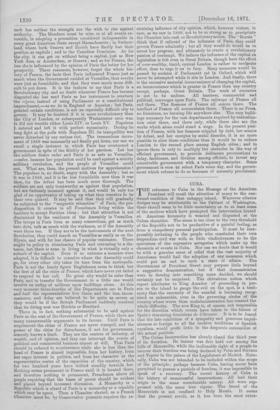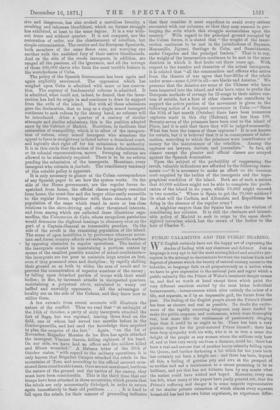CUBA.
THE reference to Cuba in the Message of the American President will recall the attention of many to the con- tinued condition of that unhappy island. Whatever ulterior designs may be attributable to the Cabinet of Washington, there should seem to be little uncertainty as to at least some of the motives which have prompted the intervention hinted at. American humanity is wearied and disgusted at the Cuban shambles. The scene is too close to the very threshold of the Republic not to be productive of a painful feeling, as from a compulsory personal participation. It must be inex- pressibly irritating to the people who concluded their own stupendous civil war with so little vindictiveness to be the spectators of the repressive savageries which make up the chronicle of events in Cuba. Nor can we doubt that it would be with a genuine sense of relief that the vast majority of Americans would hail the adoption of any measures which could put an end to such a state of affairs. The Government of President Grant may purpose little beyond a suggestive demonstration, but if that demonstration were to develop into something more decided, we should certainly not be surprised. The chivalrous notion which report attributes to King Amadeo of proceeding in per- son to the island to gauge the evil on the spot, is a testi- mony that the enormity of the scandal is becoming recog- nised as unbearable, even in the governing circles of the country whose worse than maladministration has created the whole difficulty. The new King is, of course, not responsible for the direction which events have taken in the fairest of Spain's remaining dominions de Ultramar. It is to be feared that the into exhibition of a sympathy and generous impul- siveness so foreign to all the modern traditions of Spanish royalism, would profit little in the desperate extremities of the actual position.
The Cuban Insurrection has already closed the third year of its duration. Its banner was first held out among the hills of Manzanillo, while the inalienable right of a people to recover their freedom was being declared by Prim and Serrano and Topete in the palace of the Legislature at Madrid. Natu- rally, Cuba was not intended to be included within the scope of the principle ; perhaps because Cuba, having never been permitted to possess a particle of freedom, it was impossible to speak of a recovery. The recent history of Cuba is the history of unsuccessful insurrections. All had their origin in the same unendurable misery. All were sup- pressed with the same iron rigour. The breed of the Mouraviefs is not confined to Holy Russia. It seems that the present revolt, as it has been the most exten- sive and dangerous, has also evoked a merciless ferocity, a revolting and inhuman bloodthirst, which no former struggle has exhibited, at least to the same degree. It is a war with- out truce and without quarter. It is not conquest, nor the restoration of order, nor the chastisement of rebellion, but simple extermination. The creoles and the European Spaniards, both members of the same fierce race, are worrying one another with the unslaked fury of their native bloodhounds. And on the side of the creole insurgents, in addition, are ranged all the passions, all the ignorance, and all the revenge of those 400,000 slaves who form the most terrible feature in the wretchedness of Cuba.
The policy of the Spanish Government has been again and again explicitly announced. The oppression which has weighed upon Cuba is admitted with more or less reserva- tion. The urgency of fundamental reforms is admitted. It is admitted, what could not, indeed, be denied, that the insur- rection has had its origin in and continues to draw its support from the evils of the island. But with all these admissions goes the declaration, that so long as a single armed insurgent continues to seek redress by the strong hand, no reforms will be introduced. After a quarter of a century of similar attempts and similar admissions, this is the position adopted anew by the Cabinet of Madrid. Doubtless, to facilitate that restoration of tranquillity, which is to allow of the inaugura- tion of reform, every armed insurgent who abandons the appeal to force is straightway indicted before a drumhead court, and logically shot right off for his submission to authority. It is in this circle that the action of the home Administration, or its colonial representatives, moves. Sweeping reforms are allowed to be absolutely required. There is to be no reform pending the submission of the insurgents. Meantime, every insurgent who submits is fusaado. The conciliatory tendency of this notable policy is apparent. It is only necessary to glance at the Cuban correspondence of any Spanish paper to see how the system works. On the side of the Home government, are the regular forces de- spatched from home, the official classes regularly recruited from home, the coastline and the larger cities easily accessible to the regular forces, together with those elements of the population of the same which stand in more or less close relations to the slave-driving and other threatened interests, and from among which are collected those illustrious raga- muffins, the Voluntarios de Cuba, whose scrupulous patriotism would denounce the slightest leanings to clemency even on the part of a Captain-General as treasonable practice. On the side of the revolt is the remaining population of the island. The scene of open hostilities is by preference wherever moun- tain and forest country affords advantages for guerrilla warfare • by opposing obstacles to regular operations. The tactics of the insurgents consist in maintaining a partizan contest by means of the smallest possible number of actual combatants— the insurgents are too poor to maintain largo armies on foot, even if they possessed arms and discipline ; by rapidly shifting their ground so as both to widen the area of revolt and to prevent the concentration of superior numbers of the enemy ; by falling upon detached parties of troops with their small bodies ; in fine, by incessant attacks in unexpected quarters, maintaining a perpetual alerte, calculated to weary out
baffled and unwieldy opponents. All the advantages of locality are on the side of the Cubans, and they know how to utilize them.
A few extracts from recent accounts will illustrate the nature of the conflict. Thus we read that " at midnight of the 16th of October, a party of sixty insurgents attacked the fort of Baga, but was repulsed, leaving three dead on the field, one of whom had served two months before in the Contra-guerrilla, and had used the knowledge then acquired to plan the surprise of the fort." Again, " on the 1st of November, Brigadier Morales de los Rios has again attacked the insurgent Vincent Garcia, killing eighteen of his band. On our side, we have had an officer and five soldiers killed and fifteen wounded." A Habana letter of the 30th of October states, " with regard to the military operations, it is only known that Brigadier Campos attacked the rebels in the mountains of Toro, and according to the official account occa- sioned them considerable losses. Ours are not mentioned, but from the nature of the ground and the tactics of the enemy, they must have been considerable. This is the third time that our troops have been attacked in these mountains, which proves that the rebels are only momentarily dislodged, in order to return
again immediately to their old positions It is hard to fall upon the rebels, for their manner of proceeding indicates
that they consider it most expedient to avoid every serious encounter with our columns, so that they may succeed in pro- longing the evils which this struggle accumulates upon the country." With regard to the principal ground occupied by the Cuban forces, it is stated that " the weight of the insur- rection continues to be met in the jurisdictions of Bayamo, Manzanillo, Jiguani, Santiago de Cuba, and Guantanamo, under Cespedes and the principal leaders." That is to say, the weight of the insurrection continues to be met in the same districts in which it first broke out three years ago. With respect to the number and character of the actual insurgents, it is related that " all the commanders and officers who arrive from the theatre of war agree that four-fifths of the rebels under arms—some 6,000 in all—are blacks and Asiatics." We presume that the Asiatics are some of the Chinese who have been imported into the island, and who have come to prefer the European methods of revenge for ill-usage to their native cus- tom of suicide, but a hint of other classes who contribute to support the active portion of the movement is given in the following notice of a frequent occurrence in Cuba :—" Since the 30th of last month (October) there have been numerous captures made in this city (Habana), not less than 100. Seventy-seven of the prisoners have been sent to.the island of Pines, and it is said that there they will be judged summarily. What has been the reason of these captures ? It is not known for certain, but it is believed that it is in consequence of infor- mation, according to which tho prisoners were contributors of money for the maintenance of the rebellion. Among the captures are lawyers, doctors, and journalists." In fact, all classes except the planter and official classes are arrayed against the Spanish domination.
Upon the subject of the probability of suppressing the revolt, valuable indications are afforded by the following state- ments :—" It is necessary to make an effort on the immense scale required by the tactics of the insurgents and the topo- graphical condition of the island. Both are of such a nature that 40,000 soldiers might not be able to complete the pacifi- cation of the island in six years, while 70,000 might succeed in two months." Where is Spain to get the 70,000 soldiers 3 Or what will the Carlists, and Alfonsists. and Republicans be doing in the absence of the regular army V
A mightier empire than the Spains has seen the wisdom of conciliating her colonies. It is still the obstinate and intract- able policy of Madrid to seek to reign by the same short- sighted terrorism which lost the crown of the Indies to the heir of Charles V.











































 Previous page
Previous page